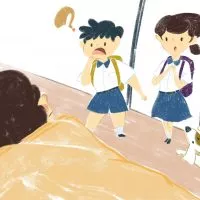媽媽 病 咗
Mom is sick.
Mamá está enferma.
お母さんが病気です
今日 三點鐘 放學 , 我 同 家姐 一齊 搭 地鐵 返 屋企 。
Today at three o'clock after school, my sister and I took the subway home together.
返 到 屋企 , 一 行 到 房門 就 見到 媽媽 瞓 咗 喺 床 上面 。
When we got home, as soon as we reached the bedroom door, we saw Mom sleeping on the bed.
天氣 好 熱 , 但係 媽媽 話 覺得 凍 。
The weather is very hot, but Mom says she feels cold.
我 同 家姐 未 見 過 媽媽 瞓 晏覺 , 覺得 有啲 奇怪 。
My sister and I have never seen Mom sleep late before, so we find it strange.
我 問 家姐 : 「 家姐 , 而家 應該 點 做 好 ? 」
I ask my sister, "Sister, what should we do now?"
家姐 答 我 : 「 我 都 唔知 應該 點做 好 。 」
My sister answers, "I don't know what to do either."
我哋 兩 個 企 咗 喺 房門 , 唔 知 要 做 啲 咩 好 。
The two of us stand by the bedroom door, not sure what to do.
家姐 諗 咗 一陣 , 同 我 講 : 「 我 諗 到 喇 !
My sister thinks for a moment and tells me, "I've got an idea!
Mi hermana se tomó un tiempo para pensarlo y me dijo: "¡Yo lo pienso!
我哋 病 嗰陣 , 媽媽 會 畀 好多 好多 水 我哋 飲 㗎 ! 」
When we were sick, Mom would give us lots and lots of water to drink!"
Cuando estamos enfermos, mamá nos da mucha agua para beber.
我 跑 去 廚房 拎 杯 水 畀 媽媽 。
I run to the kitchen to get a glass of water for Mom.
媽媽 聽到 我 想 去 拎 水 , 細細聲 同 我 講 : 「 唔該晒 細佬 ! 」
When Mom hears that I want to get her water, she softly says to me, "Thank you, little one!"
家姐 入 房 拎 電話 打 畀 爸爸 話 媽媽 唔 舒服 。
My sister goes into the room to call Dad and tell him that Mom is not feeling well.
講 完 電話 , 家姐 又 話 : 「 喂 , 細佬 , 我 同 爸爸 講 咗 喇 !
After hanging up the phone, my sister says again, "Hey, little one, I've talked to Dad!
爸爸 話 , 媽媽 要 瞓 多 一陣 , 不如 我哋 幫 媽媽 做 家務 , 你 話 好唔 好 ? 」
Dad says Mom needs to rest a bit longer. How about we help Mom with the housework? What do you think?"
我 笑 住 點頭 , 話 : 「 好 啊 !
I smile and nod, saying, "Sure!"
Asentí con la cabeza sonriendo y dije: "¡Vale!
我 去 廁所 洗 衫褲 , 家姐 你 去 抹 個 廳 同 房 啦 ! 」
I go to the bathroom to wash my clothes, and sister, you go wipe the living room and the bedroom!
講 完 , 我哋 兩 個 跑 咗 入 房 。
After saying that, the two of us rush into the room.
我 去 拎 啲 衫褲 入 廁所 洗 , 家姐 入 房 抹 床 、 房門 同 櫃 。
I go to get my clothes and wash them in the bathroom, while my sister cleans the bed, the bedroom door, and the cabinet.
我哋 仲 一齊 幫 屋企 兩 隻 兔仔 同 狗仔 沖涼 。
We even give our two bunnies and dog a bath together.
好 快 , 我哋 已經 幫 媽媽 做好 晒 家務 。
Wow, we've already finished all the household chores for Mom.
媽媽 見 我 同 家姐 都 係 好 幫手 , 覺得 好 開心 。
Mom sees that both my sister and I are great helpers and feels very happy.
第二 日 , 爸爸 畀 咗 架 我 好 鍾意 玩 嘅 玩具 巴士 我 , 同埋 家姐 好 鍾意 嘅 衫 畀 家姐 —— 佢 話 係 乖 嘅 小朋友 先 有 㗎 !
The next day, Dad gives me a toy bus that I really like, and he also gives my sister a shirt she loves—he says it's only for good children!
我 以後 都 要 做 一 個 幫 媽媽 做嘢 嘅 小朋友 !
From now on, I want to be a helpful child for Mom!

